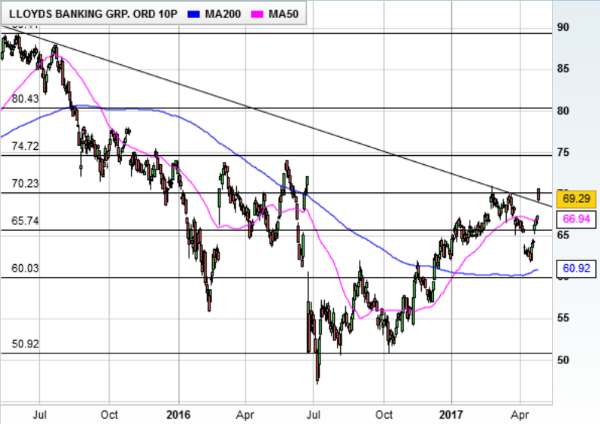Lloyds Bank could deliver big returns after new upgrades
28th April 2017 17:05
by David Brenchley from interactive investor
Share on
How does 19% total shareholder returns over the next 12 months sound? Well, that's what one analyst is predicting for popular high-street lender
We reported Thursday the banking giant's cracking set of first-quarter results that included an underlying pre-tax profit of £2.08 billion, a massive 10% better than City expectations.
That didn't quite generate a raft of upgrades from analysts covering the bank's shares, but we also reported that the likes of Investec remained positive on the stock.
However, a new broker note has landed with a thump at Interactive Investor HQ, suggesting Lloyds shareholders are in for a windfall if they sit tight.
True, it's not a huge upgrade, but Barclays analysts Rohith Chandra-Rajan and Aman Rakkar repeat their 'overweight' stance on Lloyds and have nudged their price target higher by a couple of pence, or 3% to 77p.
Combined with a forecast dividend of 5p, they say, this would offer 19% total shareholder returns (TSR) over the next 12 months. "At 8.9 times underlying 2017 earnings, 1.3 times tangible book value and a 7-9% dividend yield, we continue to see the shares as attractive," they say.

Lloyds' 14.3% core equity tier 1 (CET1) in the first quarter is "healthy" and the Barclays pair see 13% as an "appropriate" ratio going forward. This improvement in capital triggers an increase in dividend forecasts by 1p for each of the next three years, to 5p, 5.5p and 6.1p in 2019.
They also increase underlying earnings per share (EPS) estimates by 5% for 2017 to 7.8p, then 3% for both 2018 and 2019. "The main drivers are a 3% benefit from a higher net interest margin through 2019 and 2% from lower 1Q17 provisions," they continue.
"The stronger net interest margin reflects our expectations that much of the 10 basis point increase in 1Q17 can be sustained."
Lloyds shares haven't traded at 77p since late October 2015, and the stock plummeted almost 40% to a low of 47p post the EU referendum last year. However, since then it has staged an almost full recovery and is now nearly 50% higher. A recovery to 77p would have seen the stock grow by two-thirds.
But the broker does not stop there. As is their wont at Barclays, they also set out an 'upside' case, predicated on "faster improving returns from higher revenues and lower provisions as a result of a better-than-feared outcome on economic uncertainty in the UK following the [Brexit vote]".
That upside target, they say, stands at a mega 115p – two-thirds higher than the current share price.
Here's the risk
But their base case is what we are more concerned with. They expect Lloyds to sustain close to a 15% underlying return on tangible equity (ROTE), generating enough cash to return around a quarter of its current market cap (just shy of £50 billion) to shareholders over the next three years.
The government's 2% stake should also be offloaded in the coming month or so which would be "a positive", though the analysts do not see the current overhang as a particular issue.
A forecast full-year 2017 price/earnings (PE) ratio of 8.9 times looks attractive and Stockopedia's Ben Hobson told us Wednesday that "companies that surprise the market by beating consensus forecasts do tend to see their prices go higher over the following 3-6 months".
We'll see, but we also pointed out that 70p is a big number for Lloyds:
"70p is the 50% Fibonacci retracement of the decline from 2015 high to post-referendum levels at around 50-51p," we said. "It has been a barrier to progress recently and there is further historical significance, with several touch points both as support and resistance over the past eight years."
This article is for information and discussion purposes only and does not form a recommendation to invest or otherwise. The value of an investment may fall. The investments referred to in this article may not be suitable for all investors, and if in doubt, an investor should seek advice from a qualified investment adviser.